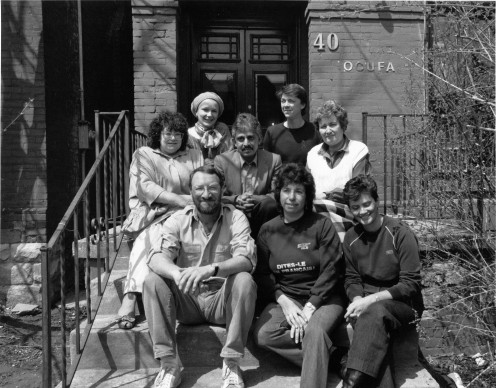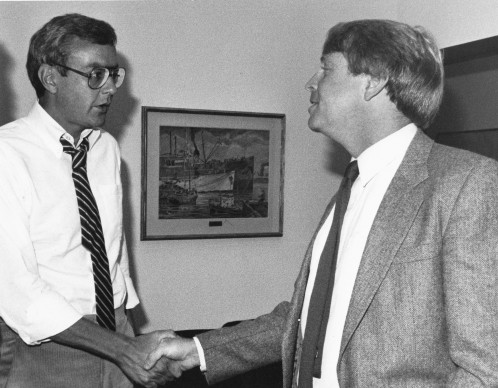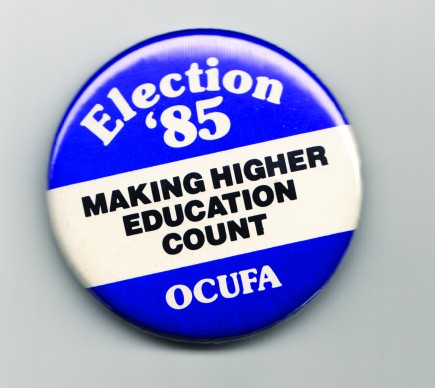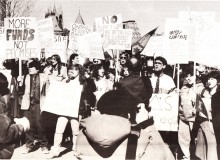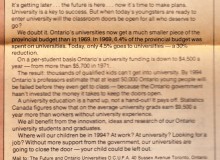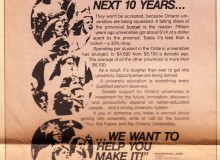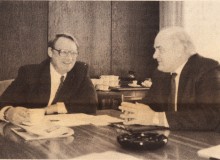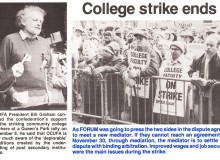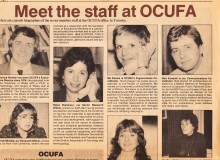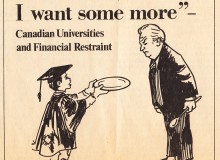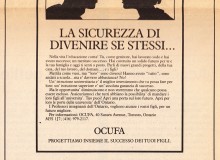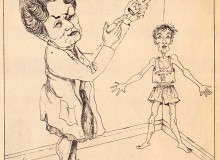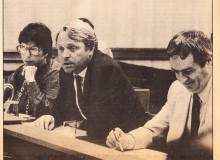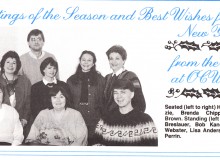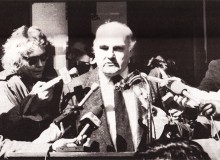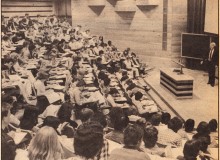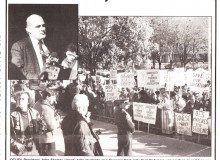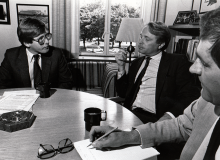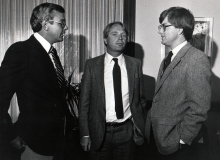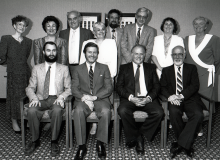
Refocusing and Restructuring: The 1980s
The expansion of Ontario’s post-secondary system came to a halt by the early 1980s. Runaway inflation that began in the mid-1970s (reaching 12.5 per cent by 1981) did not significantly decline until the early 1990s. The ensuing economic challenges, combined with governmental efforts to “rationalize” the system, ushered in a very different era for faculty by the beginning of the 1980s.
Government efforts to deal with the effects of high inflation included legislation such as 1982’s Inflation Restraint Act (Bill 179), which limited public sector wage increases to 5 per cent, eliminated the right to strike, and extended current collective agreements by one year. As well, Bill 213 allowed for direct government intervention in any university that ran an operating deficit.
Howard Epstein
A renewed focus on the system
A growing focus on the role of post-secondary education generally, and on Ontario’s post-secondary institutions in particular, resulted in the formation of a number of significant committees and research efforts. Major reports included 1981’s Report on the Committee of the Future Role of Universities in Ontario (the Fisher Report) and 1984’s Ontario Universities: Options and Futures (the Bovey Commission’s Report). As well, in 1984, the Education Minister announced a wholesale “restructuring” of Ontario’s university system.
As OCUFA’s Executive Director, Patrick Wesley, noted in his report to the Board of Directors in 1983, “It has been a year of very visible, amply reported, crises. They have come by the numbers: 179 and 213; and by alphabet soup: EPF, IRB, SERP, and so on.” (EPF is 1977’s Established Programs Financing Act; IRB was the Inflation Restraint Board, instituted in 1982; and SERP was 1978’s Secondary Education Review Project.)
OCUFA staff outside the 40 Sussex Avenue office, 1988. Front row: Howard Epstein, Helen Breslauer, Heather Webster; second row on steps: Brenda Chipperfield, Ananda Kodikara, Heather McKenzie; back row: Lisa Alexis, Glen Brown. Photo copyright Sally Gibson.
OCUFA responds
OCUFA responded to the new realities in new ways: large-scale advertising and lobbying campaigns and a number of research reports that spread the word about the crisis facing the post-secondary system.
OCUFA’s Bovey campaign, for example, was its largest outreach effort to date. Timed to coincide with the Bovey Commission hearings, the widely distributed advertisements warned that more than 50,000 qualified students could be turned away from Ontario’s universities in the next 10 years if the proposed rationalization plan took effect.
Special editions of OCUFA’s Forum focused on many of these issues as well, including the proposed restructuring of the system, the Bovey Report, and the crisis of access for students in Ontario.
Bill Jones (right), President of OCUFA, 1983–86, with David Peterson, then-Leader of the Official Opposition, Ontario
Within OCUFA, change was ongoing too. Its staff complement grew to seven by the end of the 1980s. A new ad hoc committee was also struck: the Bill 179 Committee, which surveyed members on the status of their appeals under the Inflation Restraint Act, and assisted them where possible. This committee was the first of a number of such special committees. And, in 1984, the Status of Women Committee was re-formed. In 1985, it published its first major report, Employment Equity for Women Academics: A Positive Action Strategy.
OCUFA Campaign button, 1985.
I think that OCUFA’s core mission in my day was to try to stand up for the university system, to protect its independence and autonomy. OCUFA worked to protect the quality of the universities, to educate the public and the ministries involved and the politicians about how important universities are, and to continue to get that message out.
Executive Director, OCUFA, 1984–88
Howard Epstein
Pay equity legislation was passed at that time. The way the legislation was written didn’t really apply to university faculty, because they were male ghettos. Trying to set up a way in which women faculty could be covered by pay equity legislation was therefore quite a challenge, a challenge that kept me busy and kept the committee looking at it for quite a while.
Senior Research Officer, OCUFA, 1979–95
Helen Breslauer
The addiction of being part of an organization like OCUFA is that you meet engaged people who are similarly engaged: they’re interested; they’re lively; they’re bright. And they share a common commitment to the welfare of the academy and to the academic profession. You’re not fighting the struggles you’re fighting on your own campus on your own. You realize it’s part of a larger cohort that is working to try to improve things.
Former Chair of the Collective Bargaining Committee, OCUFA
Doug Lorimer
Shortly after I got to OCUFA, hiring at universities had stopped. It was a very, very rough world for universities and much of what OCUFA was about at that time was struggling to represent faculty in a time of austerity.
Senior Research Officer, OCUFA, 1979–95
Helen Breslauer
OCUFA did more lobbying later. Bill Jones, who came in as President, and Executive Director Howard Epstein, were sort of more rough and tumble, sometimes with each other. They were more able to pull off more confrontational stuff with the outside world, too, than some of the Presidents had come before. And so OCUFA was very much shaped over time by whoever was in charge.
Senior Research Officer, OCUFA, 1979–95
Helen Breslauer
And although provincial governments like universities, they like them in a narrow way: They look to universities to support the developing economy in terms of commercializable research. They also look to universities as places where highly skilled people are going to be trained for jobs. So they tend to have a bit of scepticism about the value of good liberal arts or sciences undergraduate education. They’re very much in favour of things that they can see having a direct marketplace relationship.
Executive Director, OCUFA, 1984-88
Howard Epstein
What is OCUFA’s role? To speak up for the university system. And when you look at the university constituencies or who could stand up for them, just by the process of elimination it’s faculty who are the ones who are best placed ultimately to speak up.…
And that was probably how we saw the main function of OCUFA: to keep reminding people of the fact that universities are there. That they're doing a good job. That they're important. That we need them. And that we have to pay attention to them and nurture them.Executive Director, OCUFA, 1984-88
Howard Epstein
I’m hopeful that OCUFA will continue because it really does make sense to have a unified provincial level voice in Ontario speaking up on behalf of universities. And I just don’t see that going away. In the absence of a major constitutional change in Canada, which I don’t see on the horizon, they need to continue on. It’s one of those entities that has a good solid place in the public discourse about post-secondary education.
Executive Director, OCUFA, 1984-88
Howard Epstein
Videos
Photos
- Students and faculty rally at Queen’s Park to demand more funding for post-secondary education, March 10, 1988. From OCUFA Forum, March/April 1988.
- OCUFA advertisement, 1984. Beginning in the 1980s, OCUFA launched a number of advertising and lobbying campaigns. From OCUFA Forum, June 1984.
- OCUFA advertisement, 1984. Beginning in the 1980s, OCUFA launched a number of advertising and lobbying campaigns. From OCUFA Forum, November 1984.
- Ontario Treasurer Robert Nixon (left) and OCUFA President John Starkey at a pre-budget meeting, March 1987. From OCUFA Forum, March 1987.
- Striking community college teachers, November 1989. From OCUFA Forum, November 1989.
- OCUFA staff members, 1982. From OCUFA Forum, December 1982.
- OCUFA Forum editorial cartoon, December 1984.
- Howard Epstein, Executive Director of OCUFA, in his office at 40 Sussex Avenue, 1988. Photo courtesy Howard Epstein.
- Howard Epstein, Executive Director of OCUFA, in his office at 40 Sussex Avenue, 1988. Photo courtesy Howard Epstein.
- OCUFA staff, 1988. Photo courtesy Howard Epstein.
- Senior Research Officer Helen Breslauer in her office at 40 Sussex Avenue, 1988. Photo courtesy Helen Breslauer.
- OCUFA advertisement, 1987. This print ad was part of OCUFA’s first multi-lingual campaign, designed to reach the parents of non-English-speaking high school students. From OCUFA Forum, June 1987.
- OCUFA Forum editorial cartoon, January 1983.
- Senior Research Officer Helen Breslauer, President Bill Jones, and Executive Director Patrick Wesley at a meeting of the Social Development Committee, Queen’s Park, September 1983. From OCUFA Forum, September 1983.
- OCUFA holiday card, December 1989.
- OCUFA President John Starkey speaking at a student rally, October 1988. From OCUFA Forum, June 1989.
- Inside a university lecture hall, 1985. Faculty–student ratios increased significantly during the 1980s. From OCUFA Forum, October 1985.
- Picket line at York University, October 1985. It was the first strike by faculty members at the 25-year-old institution. From OCUFA Forum, October 1985.
- OCUFA President John Starkey speaks to students at an Ontario Federation of Students rally at Queen’s Park, October 1988. From OCUFA Forum, November 1988.
- Bob Rae, OCUFA President Bill Jones (1983–86), and OCUFA Executive Director (1978–84), circa 1984.
- Bob Rae, OCUFA President Bill Jones (1983–86), and OCUFA Executive Director (1978–84), circa 1984.
- Teaching and Academic Librarianship Awards winners, circa 1987.





